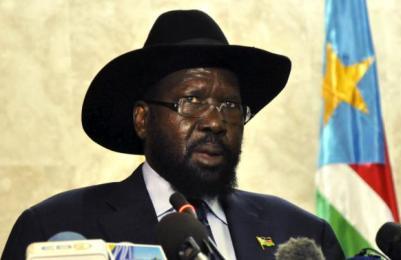Opposition alliance claims most South Sudanese opposed to 28 new states
December 19, 2015 (JUBA) – An alliance of 18 South Sudanese political parties claim majority of South Sudanese have now discovered the idea behind the creation of the 28 new state states and have joined voices objecting to President Salva Kiir’s directive.

Aligo said the way people reacted when exchange rates were floated was a demonstration that government cared less about policies which would harm ordinary people, but rather utilized it to maximise their interests at all cost.
“People have been coming to us at the alliance to say thank you for standing for truth and we told them congratulation for discovery. Now if they care about the people, let them do a survey and see what the reaction would be about these economic reforms. The result would certainly be embarrassing for them. And I challenge them to do so and let us see what happens if they deny. People are fed up”, said Aligo.
“Some of the people who initially supported the creation of 28 states are now regretting and they are the ones now championing the reverse of the decision because they have now discovered the reason”, he added.
In October President Salva Kiir criticized his current governance system which he said had been holding the people’s power in the center within Juba and proposed the need to adopt a federal system of governance in the world’s youngest nation.
“Over the last ten years, the power which was given to you by the CPA [Comprehensive Peace Agreement] has remained in the center,” Kiir told the state-owned SSTV, referring to the peace deal signed in January 2005 with Sudan.
The CPA granted South Sudanese a referendum on self-determination which resulted to overwhelming vote for secession from Sudan in 2011. He said his rationale for delaying creation of more states in devolution of powers to the people was because he was allegedly busy preparing for referendum from 2005 to 2011.
“My administration in the center was busy with issues to do with your self-determination such that you become free and sovereign state. Now, indeed you are free, therefore, there is no reason for me to retain your constitutional right for self-governance, self-reliance, self-development and determine your through free, fair and democratic elections in three years to come,” said the South Sudanese leader.
According to President Kiir, the creation of the 28 states, which was meant to come into effect within 30 days, would provide an opportunity to “develop your locality, your home villages through mobilization of local and states resources.”
“We should therefore abandon culture of war and embrace culture of peace, co-existence and hard work such [that] you and I together develop our country because our country is a country of opportunities,” stressed the president.
The order number 36/2015 AD for creation of new states of South Sudan stated that the president would now have the chance to nominate more state governors and additional members of the state assembly in his newly created states.
The sitting state members of parliament (MPs) will be maintained at 21 members in each state and there will be no more than 21 lawmakers.
The president acknowledged that his administration has been facing economic declines, surging unemployment as a consequence of the war which erupted on 15 December 2013.
It is not clear where more resources will be mobilized to fund the development of the states as the creation of 18 more states, which came as a surprise to the nation and the international community.
THE NEW STATES
In the breakdown of the states, Kiir created 8 states for greater Equatoria which included Imatong, Namurnyang, Maridi, Budi, Amadi, Jubek, Terekeka and Yei river.
For greater Bahr el Ghazal he decreed into being 10 states namely, Wau, Aweil, Ngor, Aweil East, Twic, Gogrial, Tonj, Eastern Lakes, Western Lakes and Gok.
In greater Upper Nile he decreed 10 states to include Leer, Northern Guit, Ruweng, Eastern Nile, Jonglei, Western Nile, Eastern Bie, Lajor, Buma and Western Bie.
(ST)
